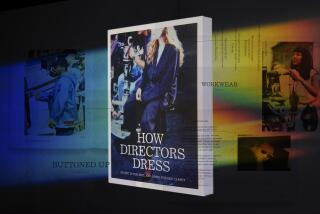Women are setting the stage for a red-carpet rebellion
The red carpet, I’ve always thought, is Hollywood back-scratching at its best.
Celebrities, treated more or less like objects, get free publicity, free dresses and the warm glow of knowing that they’ve reached the top. In turn, fashion designers and stylists get the kind of exposure that only enhances their businesses and reputations.
Everybody’s happy, right?
OSCARS: The movies, the actors, more
But even viewers who don’t know a peplum from a pothole can see that something is amiss when a star is asked about her dress and pretends not to understand the question.
“I don’t know what to say,” Nicole Kidman told Ryan Seacrest on the Grammys red carpet Feb. 8, when she and her husband, country music star Keith Urban, paused to chat.
Kidman is a fashion icon. She has worn some of the most spectacular haute couture that has ever appeared on the red carpet, and has been richly rewarded with fashion and cosmetics contracts. Was she just in a bad mood? Had she actually purchased her Thierry Mugler dress and therefore did not feel the need to flak the designer?
Or did Kidman’s comment, in its own awkward way, signal something bigger: a backlash against the practice of treating women as mindless fashion props on the red carpet?
::
There seems to be a small rebellion brewing among women actors whose jobs require them to walk that long, weird piece of real estate that gets rolled out at every awards show. Rather than being treated as hangers for fancy clothes, it seems the women would like to be treated as whole human beings.
What a concept.
The pushback began a couple years ago with the advent of the social media hashtag #AskHerMore. The hashtag grew out of an effort spearheaded by Jennifer Siebel Newsom, a former actress who wrote, directed and co-produced the 2011 Oscar-nominated documentary “Miss Representation,” which explored the limited ways women are depicted in film, television and other forms of pop culture.
#AskHerMore is an attempt to get red carpet reporters to move beyond “who are you wearing” and focus on “what are you doing?”
“I’ve had my own experience on the red carpet,” Newsom said. “You have people yelling at you and ready to discard you once they snap a photo. It’s a traumatic, uncomfortable experience. You have something to say, you are not a piece of meat, you are not a product, you are a human being who is doing important things in the world.”
The movement picked up steam a year or so ago, when actress Elisabeth Moss gave the finger to E!’s “mani cam” on the red carpet at the 2014 Golden Globes. “There’s something I wanted to do last time,” Moss said before flipping a perfectly polished bird at the camera, which had zoomed in on her manicure.
Less than a week later, on the SAG awards red carpet, Cate Blanchett refused to play along with an E! cameraman who tilted his camera up and down her body to take in the full effect of her Givenchy gown. She crouched down as his camera dropped toward her feet and, looking straight at the lens, said, “Do you do that to the guys? What do you think is going to happen down there that is so fascinating?”
This year, as the Golden Globes got underway on Jan. 11, co-host Amy Poehler tweeted: “The #RedCarpet is open and we want the media to #AskHerMore! Let’s go beyond ‘who are you wearing’ and ask better questions!”
I saw no evidence that the media asked better questions.
But on Jan. 25, at the SAG Awards, Jennifer Aniston, Julianne Moore and Reese Witherspoon all refused to stick their paws into E!’s mani cam.
“No, no, no. No mani cam,” said Aniston, before pretending to lash the cameraman with an imaginary whip.
“It’s easy to fall into the trap,” said Paula Garces, a red carpet veteran who is perhaps best known for her turn as Maria in the “Harold and Kumar” films. “Trust me, I want people to ask what I am wearing. I have talented stylists who work hard to make me look great. But I would love them to ask about my acting work and my philanthropy. Let’s take advantage of this moment to shed light on things that are cool and good for the community.”
::
It’s no surprise that Hollywood is cruel to women — they earn less, have shorter careers and are shamefully underrepresented both on and off screen.
Last year’s Sony hack, horrible as it was, confirmed in so many ways that Hollywood is still a boy’s club. Purloined emails revealed the female stars of “American Hustle” (Jennifer Lawrence, Amy Adams) earned substantially less than their male co-stars (Bradley Cooper, Christian Bale, Jeremy Renner).
Salary data showed that of Sony’s 17 highest-paid executives, studio chief Amy Pascal, who lost her job as a result of the cyberattack, was the only woman.
Six days after she was fired, in an interview with Tina Brown, Pascal was unapologetic about the pay gap.
“Here’s the problem,” she said. “I run a business. People want to work for less money, I pay them less money. I don’t call them up and go, ‘Can I give you some more?’ The truth is that what women have to do is not work for less money, they have to walk away. People shouldn’t be so grateful for jobs. People should know what they’re worth and say no.”
I guess the same goes for the red carpet.
If you don’t like the questions you’re getting Sunday at the Oscars, ladies, put your well-tended hands in the air and just step away.
Twitter: @robinabcarian
More to Read
Sign up for Essential California
The most important California stories and recommendations in your inbox every morning.
You may occasionally receive promotional content from the Los Angeles Times.











